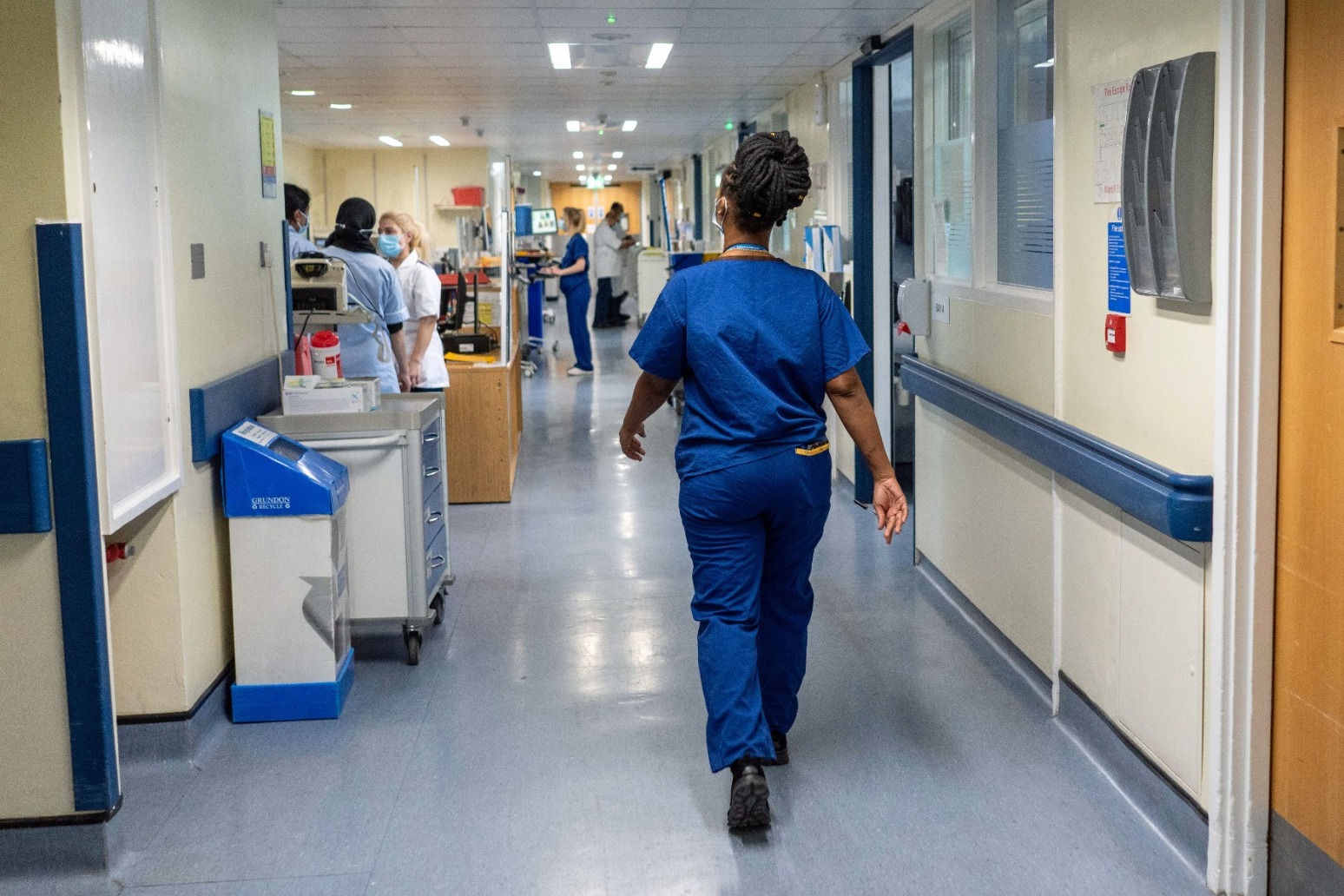-
 play_arrow
play_arrow
Kl 1 Radio Local radio for west Norfolk
-
 play_arrow
play_arrow
KL DISCO KL Disco Playing Disco Music from the 70's onwards.24/7
-
 play_arrow
play_arrow
KL COUNTRY KL COUNTRY Playing New and Classic Country Music 24/7
-
 play_arrow
play_arrow
KL ROX KL ROX The best of New and Classic Rock.24/7
-
 play_arrow
play_arrow
KL SUMMER Summer Vibes 24/7 from KL1 Radio across West Norfolk
-
 play_arrow
play_arrow
KL CLASSICAL Your Symphony Starts Here
-
 play_arrow
play_arrow
KL CHILL Just Chill!
-
 play_arrow
play_arrow
KL POP The Best POP Hits all day Long!
-
 play_arrow
play_arrow
KL XTRA KL XTRA
music_note

The Government will not meet its ambition of getting NHS waiting times down to 18 weeks without investing in more capacity for primary care, children’s services and mental health, according to trust leaders.
They also warned there is a “fundamental mismatch” between demand for services and what the NHS is able to do.
The NHS Providers’ annual State of the Provider Sector survey – which included responses from 171 leaders across 118 trusts – found almost all (96%) are concerned about the forthcoming winter.
The top three biggest issues are the delayed discharge of patients from hospital beds once fit to leave, social care capacity, and the number of beds.
It comes after the Labour Government outlined its ambition to ensure 92% of patients receive care within 18 weeks within the next five years.
To meet the target, it has pledged to deliver an extra two million NHS appointments a year.
Currently, the waiting list stands at 7.6 million, with the latest figures showing some 282,664 people in England had been waiting more than a year to start routine hospital treatment at the end of August.
The poll found almost three-quarters of trust leaders (71%), and all bosses from acute specialist and ambulance trusts, think it is unlikely or very unlikely that the NHS can meet 18 weeks over the next five years.
The NHS target, which calls for 92% of patients to start their treatment within 18 weeks, was last hit in February 2016.
The boss of one NHS trust said: “The Government have got the most focus on getting back to 18 weeks, which is the hardest standard to meet of all.
“If you think, there were seven million people on a waiting list, and as fast as you take them off, currently, we’re putting more people on.
“So that is a huge numbers game that’s going to cost a huge amount of money, unless you can do something to arrest the increase of people going on to waiting lists.
“If you don’t create the capacity in primary care, in children’s services, in mental health, you can’t do the management of people properly in the community and stop them getting so acutely unwell.”
Saffron Cordery, deputy chief executive of NHS Providers, said: “There will be progress, but can trust leaders, with hand on heart, say that they’re going to meet that 18-week standard? I think that is really difficult and challenging to predict.”
The survey also found 79% of trust leaders are either worried or very worried about meeting demand for services over the next year, a similar proportion to 12 months ago but higher than the 61% reported before the pandemic.
Concerns were raised about bed capacity and recruitment in certain services, with growing waiting lists intensifying the issues.
It comes as a report from the Institute Fiscal Studies claimed NHS performance “remains worse” than prior to the Covid-19 pandemic, although “hospital activity has increased substantially over the last year”.
The boss of a trust that provides community and mental health services warned children are being “let down” amid “enormous” waiting lists.
“It’s really disappointing to see how absent children are, first of all in terms of policy, and I couldn’t account more strongly the extent to which I think they are being let down collectively,” they said.
“Waiting lists are enormous and are simply growing as things stand.
“And that’s not to say there are lots of things being tried, lots of innovation, lots of really very good work, but there is a fundamental mismatch between demand and capacity as things stand.”
Last month, the Government said its 10-year plan for the health service will include shifting more care from hospitals into the community.
Almost all (98%) trust leaders supported the policy change, although 72% said they are either worried or very worried about whether sufficient investment is being made in public health and sickness prevention in their local area.
In her Budget, Chancellor Rachel Reeves described the £22.6 billion increase in the day-to-day health budget as a “down payment” on the 10-year plan.
She also insisted it will “bring waiting lists down more quickly” and towards the 18-week target.
However, Ms Cordery said the funding “needs to cover significant costs”, such as pay rises.
“In terms of the Budget allocation, what we do know is that much of it is already allocated. And I think that’s going to be one of the challenges,” she said.
“The big 22-plus billion pounds is across two years and then, when you drill into that, it needs to cover significant costs that are already allocated.
“So that includes pay rises, which are going to eat into that significantly.
“In terms of those allocations, I think they’re big numbers, they’re welcome numbers, but, in terms of outgoings already slated, we know that they’re not going to go that far.”
Ms Cordery also touched on the rise in employers’ national insurance contributions announced in the Budget amid concerns the change could affect GPs, hospices and care homes.
“We know that the national insurance contributions are going to be covered for NHS services but beyond that we genuinely don’t know what’s going to happen,” she said.
One trust leader described the “real tough financial conditions of our local government partners” and warned the Budget will add to problems for some services.
They added: “Given that they have to balance their books every year, because it’s their statutory responsibility, they are finding it really challenging, and I think the new Budget will be even harder for them, especially if care homes and domiciled agencies have to incur the NI costs that they have at the moment – that’s only going to increase problems in the sector.”
On collective action by GPs, which started in August and includes limiting patient contacts, one trust leader said their staff are not reporting a huge impact as it “was quite slow to get going”.
They added: “There is no doubt that, if it goes on for a long period of time, and gains traction – because I’m not sure if it’s gained universal support – then it will impact, especially in the dead of winter.
“But, at the moment, my colleagues are not saying to me, day in day out, that they’re seeing a marked difference because of GP action.”
Health Minister Karin Smyth said: “We inherited an NHS that is broken, but we are fixing the foundations with a nearly £26 billion boost for the NHS over this year and next.
“We’ve already eliminated A&E strikes, making this the first winter in three years that all A&E staff will be on the front line, not the picket line, and we’re working with trusts to make sure the system is prepared for what is always a challenging period.
“Through our 10 Year Health Plan we will build an NHS that is fit for the future and delivers for patients all year round, as we work towards our commitment to ensuring patients can expect to be treated within 18 weeks.”
Published: by Radio NewsHub

Similar posts
Upcoming shows

Ian Campfield – KL1 Afternoons
1:00 pm - 4:00 pm

Richard Dix – KL1 Drive
4:00 pm - 7:00 pm

80’s ’til 8
7:00 pm - 8:00 pm

Gary Steele – Rock Show
8:00 pm - 11:00 pm

Night Trax
12:00 am - 7:00 am
-

Unemployment rate hits near four year high as wage growth falls ONS

Warm weather and late Easter boost retail sales by 7

Tuesdays briefing Van Dijk backs Alexander Arnold and Blades are Wembley bound

Simple MRI scan can spot heart disease risk 10 years early scientists say

Wegovy slashes heart disease risk even before people shed weight
Message Us
Copyright The Mediasite UK - 2025



